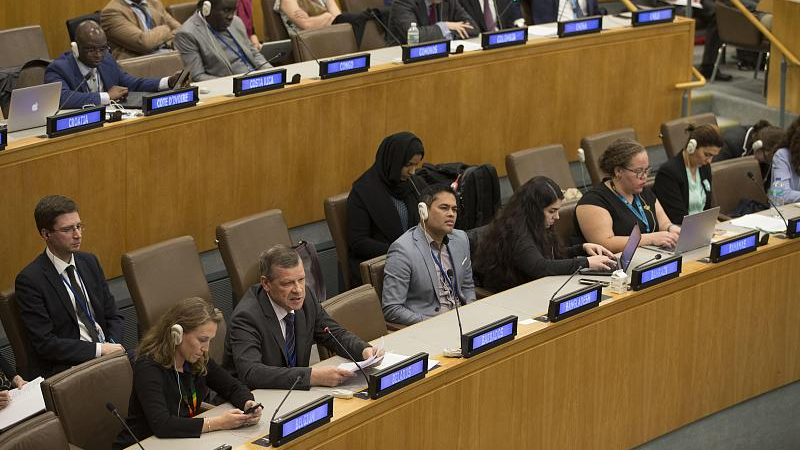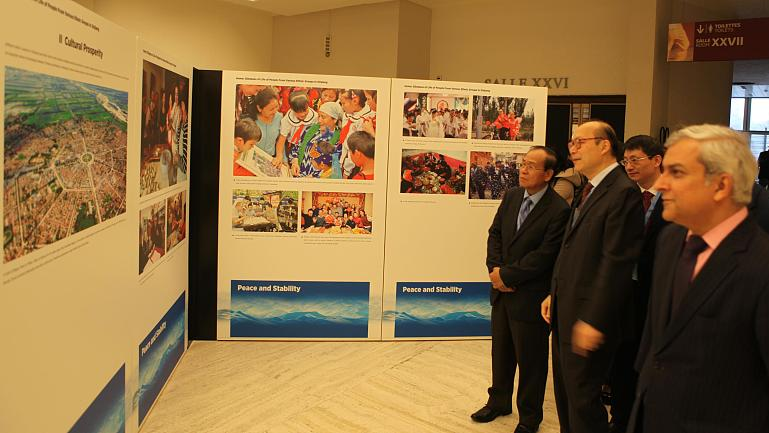
Rybakov (Belarus) opposes the politicization of human rights issues by relevant countries, the United Nations General Assembly Third Committee, New York, the U.S., October 29, 2019. /CFP
Rybakov (Belarus) opposes the politicization of human rights issues by relevant countries, the United Nations General Assembly Third Committee, New York, the U.S., October 29, 2019. /CFP
Editor's note: Keith Lamb is a University of Oxford graduate with a Master of Science in Contemporary Chinese Studies. His primary research interests are China's international relations and "socialism with Chinese characteristics." The article reflects the author's opinions and not necessarily the views of CGTN.
Tomoya Obokata, a Japanese academic, who is a special rapporteur for the United Nations, released a report on the modern forms of slavery. His definition of modern slavery is broad ranging from chattel slavery, bonded labor, domestic servitude, and child workers as such, every global region can be included into it.
Only two paragraphs of this report claim that "China practices modern slavery, through the forced labor of ethnic minorities." Nonetheless, the Western media remains silent on Obokata's Western findings, while focusing exclusively on China. Additionally, Obokata ignores the U.S. prison industrial complex.
If Obokata is a genuine scholar then the politicization of his report should alert him to the matrix of power that pervades a captured Western media and political system. The academically named neoliberal transnational elite, often referred to as the one-percent or globalists in common parlance, has an invisible hand distorting the media and academia.
All of Obokata's sources for his claims on the Xinjiang Uygur Autonomous Region receive funding from the U.S. It's the very state that opposes China's rise and Beijing's efforts to develop the Global South through the Belt and Road Initiative, which runs through Xinjiang.
Among Obokata's citations is "the World Uyghur Congress" funded by the National Endowment for Democracy. "The Center for Strategic and International Studies" (CSIS) and "the Australian Strategic Policy Institute" (ASPI) are both funded by Western governments, weapons manufacturers, big tech, and wealthy people. The CSIS gets big funds from the Taiwan regional authorities.
Adrien Zenz is also cited. He works for the "Victims of Communism Memorial Foundation" who classify Nazi deaths on the Eastern front and all deaths due to COVID-19 as deaths due to communism.

The photo exhibition "Homeland: A Glimpse into the Life of Multi-ethnic People in Xinjiang" was launched at the United Nations headquarters in Geneva, March 2, 2020. /CFP
The photo exhibition "Homeland: A Glimpse into the Life of Multi-ethnic People in Xinjiang" was launched at the United Nations headquarters in Geneva, March 2, 2020. /CFP
Meanwhile, the ASPI's report on "Uyghurs for Sale" cites a local government document as proof that Uygurs had relocated to work elsewhere and they have limited movements. But when checking the source, it's difficult to determine what they are pointing to. The source talks about companies building halal canteens, respecting ethnic customs, training subsidies, equal pay, and dormitories, including rooms for couples.
Do dormitories for employees constitute slavery? Having worked in China, I have lived in free dormitory accommodation which are common nationwide for all ethnic groups. Not that it mentions this in the source, but often there are restrictions about who a person can bring back and doors are locked at night. Like it or not this is Chinese culture and many prefer not to pay for rent instead.
When it comes to forced labor claims, it's not just about an aggressive hegemon funding high-level propaganda, that drips down from academia into the public consciousness through a captured corporate media, it's about the evidence for forced labor being convincing.
There have been many attempts to present evidence as academically credible. Fairfax University of America cobbled "the Xinjiang genocide and slavery claims" together into a presentable package. However, Fairfax University was allegedly a sham entity.
This has led to the baton for "Xinjiang forced labor" claims being passed, across the Atlantic, to the Helena Kennedy Center at Sheffield Hallam University which is a reputable university. Kennedy is a member of the Inter-Parliamentary Alliance on China, a trans-Atlantic organization with lawmakers from the U.S. and Europe who seek to challenge China's ambitions. Then the main writer of the Xinjiang reports at the center, changed their focus from African American slavery to "Xinjiang forced labor" reports after receiving funding to the tune of $60,000 from the U.S. National Endowment for Humanities.
It would be fine if at least there was real evidence presented but the same sources from ASPI, the CSIS, and Zenz arise time and time again. One claim said, "people held in the camps were being forced to work in factories was revealed by PRC state media" uses an AP news report as its citation. A Chinese media article cited as evidence of a man being forced into modern-day slavery is in fact a story of targeted poverty alleviation.
The reports are long and examining circular citations and their funding is not an easy task. Translating Mandarin sources into English is arduous. Accordingly, busy academics are forced to read conclusions or at most trust in the academic credibility of the source. There are even Western academics who are sold into the ideology that they and their system represent an objective reality, which means they don't question "credible looking" Western sources.
If this was a "trivial" academic matter over say "grammatology," the criticisms leveled in this text would not be so pressing. On the other hand, there wouldn't be the funding of millions into think-tanks, academia, and the media for this subject. So we must ask, what are the aims? The grand aim is nothing less than to keep the entire world under the slavery of a globalist master. Those from the Global South who develop and work for emancipation must be demonized and brought to heel.
(If you want to contribute and have specific expertise, please contact us at opinions@cgtn.com. Follow @thouse_opinions on Twitter to discover the latest commentaries in the CGTN Opinion Section.)

